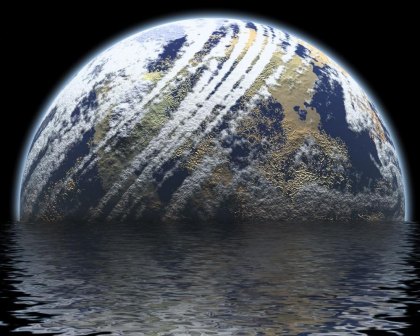Research:
Climate change could be fast, irreversible

Climate change may happen more quickly than anticipated.
Stock image.
The paper, published in the journal Atmospheric Chemistry and Physics, warns that “longevity of the carbon in the climate system and persistence of the induced warming may lock in unavoidable, highly undesirable consequences.” The authors suggest that policymakers declare a global emergency.
In reaching their conclusions, scientists used computer modeling, along with evidence from paleoclimatology (data about the past derived from natural sources such as tree rings, ice cores, corals, and ocean and lake sediments, according to the National Oceanic and Atmospheric Administration) and built on established research.They wrote of violent storms and asserted that a sea level rise of several meters is possible within 50 to 150 years.
The lead author is James Hansen of Columbia University Earth Institute, a well-known scientist who frequently speaks out about climate change. The other authors are 18 scientists from around the world. Here are the basics.
- Understanding the context: The paper refers to the Eemian Interglacial Stage, which began about 130,000 years ago. As an interglacial period featuring milder temperatures, the Eemian is not an analog of future warming, they write, but “it is useful for investigating climate feedbacks, including the interplay between ice melt at high latitudes and ocean circulation." Recounting evidence of rapid sea level rise of several meters late in the Eemian, the scientists wrote of "extreme storms in the Bahamas and Bermuda that must have occurred when sea level was near its maximum.” During extreme storms of this period, researchers believe, powerful waves transported boulders to the shore.
- Trouble under the surface: The melting of ice shelves is of concern, they explain. "Winter conditions on parts of the North Atlantic Ocean and around the edges of Antarctica normally produce cold, salty water that is dense enough to sink to the deep ocean, thus stirring and tending to homogenize the water column. Injection of fresh meltwater reduces the density of the upper ocean wind-stirred mixed layer, thus reducing the rate at which cold surface water sinks in winter at high latitudes. Vertical mixing normally brings warmer water to the surface, where heat is released to the atmosphere and space. Thus the increased stratification due to freshwater injection causes heat to be retained at ocean depth, where it is available to melt ice shelves.”
- No turning back: “If the ocean continues to accumulate heat and increase melting of marine-terminating ice shelves of Antarctica and Greenland, a point will be reached at which it is impossible to avoid large-scale ice sheet disintegration with sea level rise of at least several meters. The economic and social cost of losing functionality of all coastal cities is practically incalculable.”
- The current “limits” aren’t good enough: Efforts to control greenhouse gas emissions and limit warming to 2 degrees Celsius are insufficient. The target, “which has sometimes been discussed, does not provide safety,” the paper asserted.
- A global emergency: Scientists conclude that “the message our climate science delivers to society, policymakers, and the public alike is this: we have a global emergency. Fossil fuel CO2 emissions should be reduced as rapidly as practical.”
Related:
In brief: Extreme outbreaks more common
Climate change: 4 ways we feel the heat
If you would like to comment, give us a shout, or like us on Facebook and tell us what you think.

